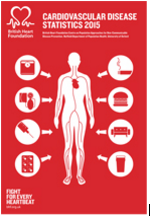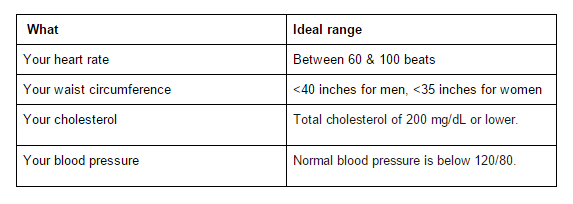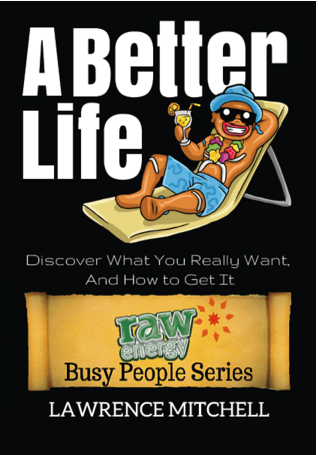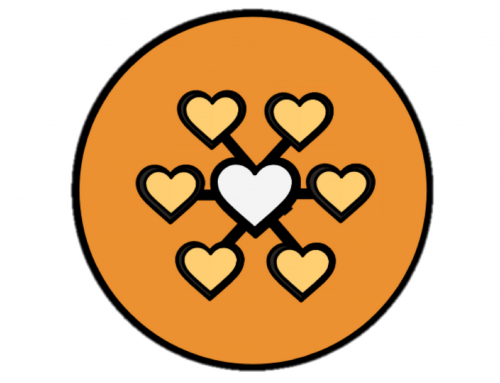
The good news is that advances in medicine and science over the last 30 years have significantly extended the lives of many people with coronary heart disease which is clearly a positive step forwards. We have come a long way, and the next 20 years is likely to see innovations that will really make the impossible possible like mechanical hearts for instance.
However, like most chronic conditions, for the vast majority of us, heart disease can be prevented with some simple mindset and lifestyle changes that will lead to an increased life span, as well as an increased health span through your more senior years.
The heart is a complex muscle: www.bhf.org.uk/heart-health/how-your-heart-works/how-a-healthy-heart-works
In the UK, February has been heart month and many companies, including RBI (Reed Business Information), have embraced this opportunity to promote and help employees incorporate healthy habits into their lives to support their hearts and overall wellbeing.
Heart Month at RBI
At RBI, It was a really good month with fitness activities, educational seminars and opportunities for people to be tested via daily drop-ins, making it as easy as possible for people to access these services.
Given that ‘prevention is definitely better than cure’, here are two things that you can do consistently to look after your heart.
1. Know your numbers
The starting point for me is always to know where you are right now with everything, and then tracking these numbers over time so that you can take corrective action if you need to. So from a heart health perspective, the numbers that matter, the ones you should know and count include:
1. Your heart rate
Have you ever tried checking your resting heart rate? A normal resting heart rate for adults is between 60 and 100 beats per minute. Generally, a lower heart rate at rest implies
more efficient heart function and better cardiovascular fitness. A well-trained athlete, for instance, might have a normal resting heart rate closer to 40 beats a minute.
Take action now. To test your resting heart rate – take your pulse and note down the number.
2. Your waist circumference
Why does the size of your waist matter. Well it’s crude measure, but is an indicator of heart disease risk. If you’re a woman and have a waist of 35 inches or more, or a man with a 40 inch waist or more, then you are in the risk category, so build your support system to help create and break habits that can help you reduce the risk. Doctors generally agree that losing just one inch off your waist will positively impact all the other heart health numbers.
Take action now: Take a tape-measure and measure around your waist at belly button level without tightness or breathing in!
3. Your cholesterol
Cholesterol isn’t all bad – it’s a type of fat that’s actually a very important nutrient. But as you’ve probably heard, there’s “good” cholesterol and “bad” cholesterol which can get very confusing. In simple terms, the three different numbers to know are your:
HDL, LDL, and triglycerides, which together provide your “lipid profile” score, but the devil is in the detail as the overall score is not nearly as important as the individual scores.
As a benchmark, the numbers to aim for are:
– Total cholesterol of 200 mg/dL or lower.
– HDL (“good” cholesterol) of 50 mg/dL or higher, if you’re a woman, or 40 mg/dL or higher, if you’re a man.
– Optimal LDL is 100 or lower, although if you have other major risk factors, like pre-existing cardiovascular disease or diabetes, your doctor may want your LDL closer to 70.
– Triglycerides of less than 150 mg/dL.
LDL is the number most doctors and heart health programs focus on, as every single point of LDL decrease makes a difference.
Take action now. make a point to get your cholesterol checked every year, using your GP or a service like: www.getlivesmart.com which will provide amazing on a whole range of other really important metrics presented in a very user-friendly online dashboard.
4. Your blood pressure
Blood pressure consists of two numbers, both of which are important:
– Your systolic pressure measures the pressure of blood against artery walls when the heart pumps blood out during a heartbeat
– Your diastolic pressure measures the same pressure between heartbeats, when the heart fills with blood.
– Normal blood pressure is below 120/80.
– Pre-hypertension is 120 to 139 (systolic) and/or 80 to 89 (diastolic).
– Hypertension (high blood pressure) – is 140 or higher (systolic) and 90 or higher (diastolic).
2. Building your unique support system for your heart to thrive
One thing that us humans all have in common is that we all have hearts and it is very much in our interest to take good care of it, as a key part of our body. It always amazes me that people take more care of their car engine than their heart, even though it is far easier (and much cheaper) to replace a car than a heart!
These four habits will help you look after your heart which will in turn enable you to live your life well:
1. Move your body consistently
I am not going to use the ‘E’ word as I know this can be off-putting for many people and throws up all kinds of objections, like: ‘Ii don’t have time to exercise’. If time isn’t on your 
Whilst getting and staying active will reduce your risk of developing heart disease, there are many other benefits too like enhancing your mood and reducing your stress.
Take action now. Decide to do 150 minutes of moderate-intensity aerobic activity every week.
2. Help others
We are not isolated beings, but are part of communities of purpose. The more we connect and help others, the better we feel as it activates regions of the brains associated with pleasure, social connection and trust. Whilst this is common sense, there’s a huge amount of scientific evidence to support the link between generosity with better personal happiness, physical and mental health and longevity, often referred to as ‘the helper’s high’ which is contagious, creating ripples throughout the community.
Take action now: what can you do to benefit from giving with the amount of resources you have. Here are a few ideas:
- Say thank you to someone, for something they’ve done for you.
- Phone a relative or friend just to say’ Hi’, they may need support.
- Ask a colleague how they are and really listen to the answer.
- Offer to lend a hand if you see a stranger struggling.
- Offer to mentor someone who can benefit from your experience.
- Volunteer in your local community.
3. Feed your heart
The food and drink we consume is the foundation of a healthy heart (and every other organ for that matter as we are whole beings). As well as feeding our cells and giving us daily energy in the short-term, what you eat and drink today will make a massive difference to how you look and feel tomorrow. So be kind to your future self, look after your heart by incorporating these healthy eating habits into your day-to-day life: Remember it’s what you eat everyday that matters, not what you eat occasionally:
1.Challenge your mindset – be honest, when you think of the term: ‘healthy food’ what comes to mind? Salad, tasteless, deprivation perhaps? I invite you to challenge that view. Healthy eating does not need to mean sacrifice, although it may mean substitution to get the maximum amount of nutrition in your body. It also doesn’t mean that you never should eat foods with little positive nutrition such as cakes, biscuits, confectionary or pastries. Just be clear on your definition of moderation. If it means a biscuit every single day, you may need to break that habit and replace it with a healthier one as research shows us, overconsumption can lead to weight gain which isn’t good for our heart of general health.
2. Learn to cook and prepare food– knowing what to eat is all very well, but being able to prepare your own food is a fundamental life skill. You don’t need to be Gordon Ramsay, but cooking basic meals does not take very long if you know what you’re doing. Whilst ‘too busy’ can be a fine excuse to buy ready meals devoid of nutrition, the habit of eating these foods consistently will increase your risk of getting a chronic disease in the future.
3. Eat real food – ie whole foods that haven’t been highly processed with added chemicals and unrecognisable ingredients. Whole foods contain all of the vitamins and nutrients your body and brain needs to function. Examples of whole foods include: eggs, vegetables, fruits, small fish, nuts, pulses. The opposite to whole foods are very refined, and usually
very palatable foods such as cakes, chocolate and sugary drinks which are sources of energy, but have little or no positive nutrition and, as research shows us, overconsumption can lead to weight gain which isn’t good for our heart of general health, so eat as little as you can manage of these!
4. Become an ingredients detective by studying labels – life is busy, so if you do chose to buy processed foods out of necessity, take time to check the labels and select products 
5. Eat the ‘superfood’ vegetables and fruits which nature has provided. These ‘superfoods’ are packed full of macronutrients that feed and fuel all of the cells in your body and brain. There are so many to chose from, but try to include a generous amount of seasonal greens and root vegetables, and sea vegetables such as seaweed that are packed with nutrients.
6. Look after gut health by consuming fermented foods. Research is emerging about the importance of maintaining a healthy gut for overall wellbeing. Our gut contains both good and harmful bacteria, and when this ratio gets out of whack, our health suffers. So feeding your gut with beneficial microorganisms is an important habit to develop. There’s plenty you can do to encourage their growth. One effective way is by eating foods packed with probiotics like fermented foods such as Sauerkraut, or drinks like Kombucha or Kefir.
7. Eat a balanced diet. Balance your diet by consuming the right amounts of all of the macronutrients which include: fat, carbohydrate and protein. Macronutrients provide you with calories or energy which your body and brain needs to thrive. How much is enough? There isn’t a simple answer to this question as we are all very different, with different lifestyles; different body shapes; different ages and different genetic blueprints. However, as a guideline, the Food and Nutrition Board, a subgroup of the Institute of Medicine, recommends:

b. 20 to 35 percent of your calories from fat, which has been the subject of much controversy over the last twenty years. Again all fat is not equal, and healthy sources of fat include cold water oily fish such as salmon, mackerel, herring, sardines and anchovies.
c. 10 to 35 percent of calories should come from protein. Healthy sources of ‘superfood’ protein include fish as well as eggs.
Changing lifestyle is not easy, but is possible if you’re committed. Often we’re not even aware of the bad habits that we have picked up over many years that are putting our health at risk and not serving us well. I believe that you can change your life one habit at a time.










